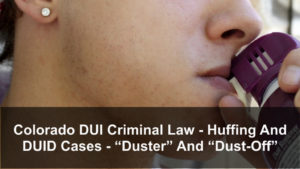




Colorado DUI Criminal Law – Huffing And DUID Cases – “Duster” And “Dust-Off”
By H. Michael Steinberg Colorado DUI Criminal Defense Lawyer – Attorney
Colorado DUI Criminal Law – Huffing And DUID Cases – Duster – There are many variations and complexities to a charge of Driving Under The Influence. One of those is driving under the influence of drugs because of the enormous variations of drug combinations out there.
One of those variations is called “driving while huffing.”
Always Start With The Law – The Elements That Comprise The Crime Of Driving Under The Influence Or Driving While Ability Impaired – In Colorado
To understand ANY charge you must start with the “elements,” the basic requirements to prove the crime, to prove the charge.
For DUI and DWAI in Colorado, the following comprise the elements of those crimes:
The Elements of Driving Under the Influence in Colorado are:
a. That the Defendant,
b. in the State of Colorado, at or about the date and place charged,
c. drove a vehicle,
d. while under the influence of [alcohol] or [drugs] or [a combination of drugs and alcohol],
The Term Driving Under the Influence
“Driving under the Influence” means driving a vehicle when a person has consumed alcohol or one or more drugs, or a combination of alcohol and one or more drugs, which alcohol alone, or one or more drugs alone, or alcohol combined with one or more drugs affects the person to a degree that the person is substantially incapable, either mentally or physically, or both mentally and physically, to exercise clear judgment, sufficient physical control, or due care in the safe operation of a vehicle.
The Elements of Driving While Ability Impaired in Colorado are:
1. That the Defendant,
2. in the State of Colorado, at or about the date and place charged,
3. drove a vehicle,
4. while his ability to operate a vehicle was impaired by [alcohol] or [drugs] or [a combination of drugs and alcohol],
The Term Driving While Ability Impaired
“Driving While Ability Impaired” means driving a vehicle when a person has consumed alcohol or one or more drugs, or a combination of both alcohol and one or more drugs, which alcohol alone, or one or more drugs alone, or alcohol combined with one or more drugs, affects the person to the slightest degree so that the person is less able than the person ordinarily would have been, either mentally or physically, or both mentally and physically, to exercise clear judgment, sufficient physical control, or due care in the safe operation of a vehicle.
What, Then, Qualifies As A “Drug” Under These Laws?
In Colorado, can a motorist be charged and convicted of DUID Or DWAID for driving a motor vehicle – (being in control of a vehicle) – after, for example, inhaling or “huffing” aerosol propellants such as the computer cleaner known as “Dust- Off.” Is Huffing this product – driving under the influence of a drug?
What Is Clear – What Is Not Clear – Some Basic Quesions
The easy case is that Colorado DUI laws prohibit the consumption of other intoxicating substances (other than just alcohol) when operating a motor vehicle. The laws in Colorado specifically prohibit the use of many different drugs that can cause intoxication.
The harder question is whether driving under the influence of a substance such as “difluoroethane” – the key ingredient in aerosol dust remover and other aerosol products – falls within the definition of an intoxicating substance that are in violation of the laws described above.
Does the catch-all term “drugs” as used in the DUI – DWAI statute include an “ingredient” such as “difluoroethane?”
Must the DUI – DWAI laws actually list every potential intoxicating substance and if the law leaves out of it’s comprehensive definition of the word “drug” and since difluoroethane was never intended for medical use, does it “qualify” as a drug under the law?
Can a person in Colorado be prosecuted for huffing and driving?
The Answer – A Common Sense Reading Of The Meaning Of “Drugged Driving”
The word “drug” is generally interpreted as any substance that alters one’s perception or consciousness. Colorado’s DUI law is not limited the pharmaceutical definition of a “drug” in the DUI statute.
The purpose of a DUI statute is obviously to protect public safety by prosecuting individuals whose ability to safely operate a vehicle is diminished by alcohol, drugs, or a combination of the two.
What IS Prohibited?
Colorado’s drugged driving law is most clearly directed at a prohibition against using controlled substances — that is, any drug or chemical regulated by the government, while driving a motor vehicle. Colorado’s definition of the term “drug” specifically includes substances intended to cure or prevent disease as listed in the U.S. Pharmacopoeia BUT it also includes this general language – “as well as toxic vapor or vapors, which include, but is not limited to, glue sniffing and aerosol inhalation.”
A drug is defined as either:
(1) A substance that is intended to cure or prevent disease, listed in the U.S. Pharmacopoeia,
(2) A controlled substance, as also defined in 18-18-202 C.R.S. or
(3) A toxic vapor or vapors including but not limited to glue sniffing and aerosol inhalation. Sections 42-4-1301(d)
The Law
Here is a reprint, as of 2017, of the relevant sections of the law discussed above:
C.R.S. § 42-4-1301 Driving Under The Influence – Driving While Impaired – Driving With Excessive Alcoholic Content – Penalties
(1) (a) It is a misdemeanor for any person who is under the influence of alcohol or one or more drugs, or a combination of both alcohol and one or more drugs, to drive any vehicle in this state.
(b) It is a misdemeanor for any person who is impaired by alcohol or by one or more drugs, or by a combination of alcohol and one or more drugs, to drive any vehicle in this state.
(c) It is a misdemeanor for any person who is an habitual user of any controlled substance defined in section 12-22-303 (7), C.R.S., to drive any vehicle in this state.
(d) For the purposes of this subsection (1), one or more drugs shall mean all substances defined as a drug in section 12-22 303 (13), C.R.S., and all controlled substances defined in section 12-22-303 (7), C.R.S., and glue-sniffing, aerosol inhalation, and the inhalation of any other toxic vapor or vapors.
(e) The fact that any person charged with a violation of this subsection (1) is or has been entitled to use one or more drugs under the laws of this state, including, but not limited to, the medical use of marijuana pursuant to section 18-18-406.3, C.R.S., shall not constitute a defense against any charge of violating this subsection (1).
A Quick Note: The Crime Of “Huffing” In Colorado
Under Section 18-18-412 of the Colorado Revised Statutes it is a crime and to unlawfully and knowingly:
Smell or inhale the fumes of toxic vapors for the purpose of causing a condition of euphoria, excitement, exhilaration, stupefaction, or dulled senses of the nervous system,
Possess, buy, or use any such substance for the purposes described above, or
Knowingly aid any other person to use any such substance for such purposes.
A “toxic vapor” is further defined a one or more of following substances or products containing such substances:
Alcohols, including methyl, isopropyl, propyl, or butyl;
Aliphatic acetates, including ethyl, methyl, propyl, or methyl cellosolve acetate;
Acetone;
Benzene;
Carbon tetrachloride;
Cyclohexane;
Freons, including freon 11 and freon 12;
Hexane;
Methyl ethyl ketone;
Methyl isobutyl ketone;
Naphtha;
Perchlorethylene;
Toluene;
Trichloroethane; or
Xylene.
Abusing toxic vapors is a Colorado Class 2 drug misdemeanor.
The Problem Is A Serious One – A New Trend In Distracted Driving – “Inhaling Duster”
All across the country, the police are responding to accidents caused by people getting high on computer cleaning products. The most common computer cleaning products are canned air duster or Compressed air dusters such as “Dust-Off.”
Inhaling dangerous products is becoming more popular every year.
The substantial increase in the use of “Duster” is the result of at least two factors:
(1) it is legal, cheap, and easy to purchase. and
(2) it is a very “short-lived high.” The use of inhalants has always been is fairly widespread, but it has, for the most part, been kept indoors or behind closed doors.
More recently, because of the nature of the high, more people are using these aerosols while operating vehicles.
Canned Air Is Also Dangerous For Other Reasons
The use of canned air is inseparable from brain damage. Depending on use, the extent of that damage can be minuscule or severe.
In 2016 a study was done on severe cardiomyopathy after huffing “Dust-Off.”
“Huffing,” the study found, or inhalant abuse, is known to cause respiratory distress, cough, hypoxia, nausea, vomiting, central nervous system (CNS) depression, and myocardial sensitization.
The conclusion of the study of Dust-Off (which is really a refrigerant-based propellant cleaner used for removal of dust and debris from keyboards, screens, and other electronics which has, as it’s active ingredient difluoroethane – a clear, colorless, liquefied hydrocarbon gas) is that when inhaled, the product:
“is harmful and may cause heart irregularities, unconsciousness, or death”
Understanding “Inhalants”
Inhalants are volatile substances that produce chemical vapors that can be inhaled to induce a psychoactive, or mind-altering, effect.
Today, while parents are appropriately and mostly concerned about illicit drugs such as marijuana, cocaine, Meth, MDMA and LSD, they do not know – or understand or well understand the dangers posed to their children from common household products that contain volatile solvents or aerosols.
Common products such as:
- glues,
- nail polish remover,
- lighter fluid,
- spray paints,
- deodorant and hair sprays,
- whipped cream canisters, and cleaning fluids
….are widely available, are toxic and are very dangerous, especially to our children.
Very Dangerous
Inhaling the vapors from these products provides quick intoxication. The high can, and often does, cause serious health consequences. Specifically, huffing canned air can cause an immediate rush of euphoria as well as possible hallucinations and delusions.
Even sporadic or single episodes of inhalant abuse can be extremely dangerous. Huffing can disrupt heart rhythms and cause death from cardiac arrest, or lower oxygen levels enough to cause suffocation. The regular abuse of these substances can result in serious harm to vital organs, including the brain, heart, kidneys, and liver.
The effects of huffing may also be paralyzing, interfering with a person’s ability to move normally or even move at all. Dizziness, loss of inhibitions, inability to make sound decisions, and slurred speech are also common results of huffing.
According to the Mayo Clinic the huffing “high” lasts about 15-30 minutes.
Sudden Sniffing Death – The Immediate Hazards of Huffing Products Such As “Dust Off”
Abusing inhalants can lead to “sudden sniffing death” by causing fatal heart failure even the first time it is tried.
The active ingredient in “Dust-Off” disrupts normal heart rhythm, which leads to heart rate irregularities that can also result death or in any one or more of the following symtoms:
Trouble breathing
Nausea
Vomiting
Lightheadedness
Chest pain
Disorientation
Loss of motor control and coordination
Drowsiness
Suffocation
Seizures
Asphyxiation
Lack of oxygen to the brain
Loss of consciousness and even coma
Injury related to poor decisions, lack of inhibitions, and increased risk-taking
Canned air is also a refrigerant, and can therefore cause frostbite of the lips, mouth, and throat when inhaled and abused. It is essentially a toxic poison that was never meant to be inhaled and can cause permanent brain damage that can lead to irreversible neurological deficits.
Summary And Conclusion – The Addiction Is Real
Abusing Dust-Off regularly may lead to psychological and physical addiction,
The immediate effects of Duster or Dust-Off, according to those who use it, are something like this:
1st Hit: Numbness, feeling of happiness and euphoria.
2nd Hit: More numbness, uncontrollable laughter and slurred speech.
3rd Hit: Same as above but now you get dizzy, and it feels as if there is a force pulling down on your body.
“It cuts off the flow of oxygen to the brain,” “It makes you light headed and weird.”
The nature of an “addiction” is that it is a brain disease stemming from compulsive drug-seeking and drug-using behaviors. A person who abuses canned air literally alters his or her brain chemistry, The brain can struggle to function normally without the substance but eventually capitulates.
Colorado DUI Criminal Law – Huffing And DUID Cases – “Duster” And “Dust-Off”
If you found any of the information I have provided on this web page article helpful please click my Plus+1 or the Share buttons for Twitter and Facebook below so that others may also find it.
The reader is admonished that Colorado criminal law, like criminal law in every state and at the Federal level, changes constantly. The article appearing above was accurate at the time it was drafted but it cannot account for changes occurring after it was uploaded.
If, after reading this article, you have questions about your case and would like to consider retaining our law firm, we invite you to contact us at the Steinberg Colorado Criminal Defense Law Firm – 303-627-7777.
Never stop fighting – never stop believing in yourself and your right to due process of law. You will not be alone in court, H. Michael will be at your side every step of the way – advocating for justice and the best possible result in your case. H. Michael Steinberg is passionate about criminal defense. His extensive knowledge and experience of Colorado Criminal Law gives him the edge you need to properly handle your case
 ABOUT THE AUTHOR: H. Michael Steinberg – Email The Author at:
ABOUT THE AUTHOR: H. Michael Steinberg – Email The Author at:
A Denver Colorado Criminal Defense Lawyer – or call his office at 303-627-7777 during business hours – or call his cell if you cannot wait and need his immediate assistance – please call 720-220-2277.
“A good criminal defense lawyer is someone who devotes themselves to their client’s case from beginning to end, always realizing that this case is the most important thing in that client’s life.”
You should be careful to make a responsible choice in selecting a Colorado Criminal Defense Lawyer. We encourage you to “vet” our firm. Over the last 40 plus years – by focusing ONLY on Colorado criminal law – H. Michael has had the necessary time to commit to the task of constantly updating himself on nearly every area of criminal law, to include Colorado criminal law and procedure and trial and courtroom practice.
Putting more than 40 years of Colorado criminal defense experience to work for you.
H. Michael works hard to get his clients the best possible results in and out of the courtroom. He has written, and continues to write, extensively on Colorado criminal law and he hopes this article helps you in some small way – Colorado DUI Criminal Law – Huffing And DUID Cases – “Duster” And “Dust-Off”













